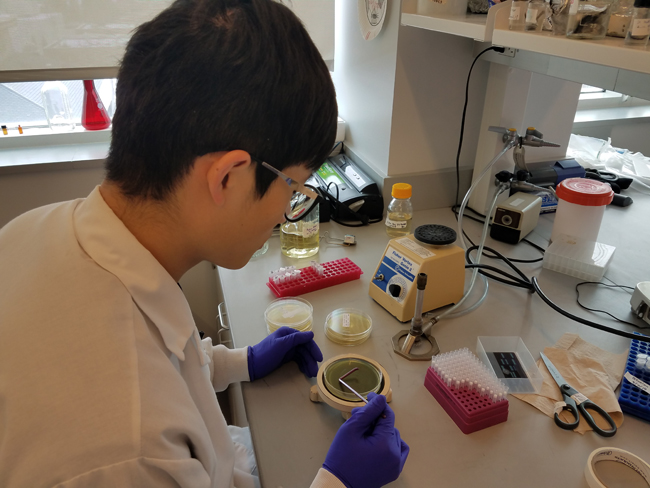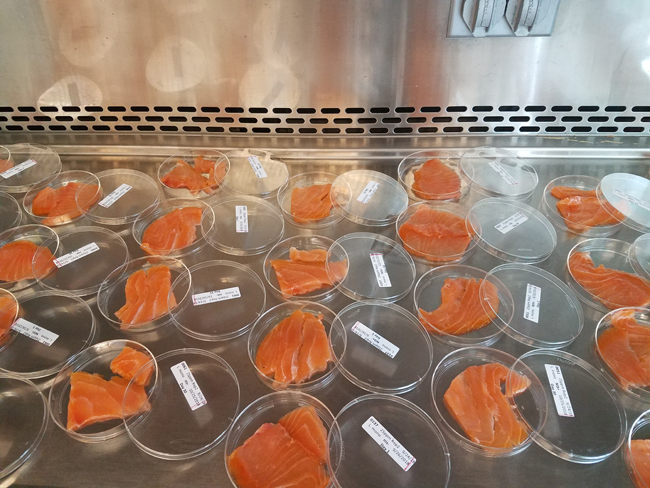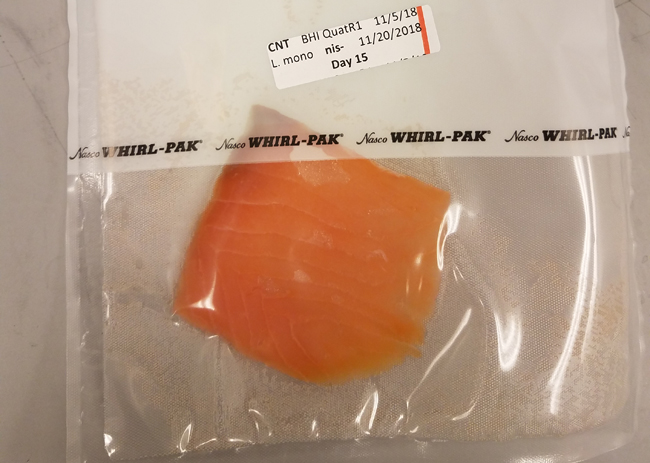
Ruixi Chen, Department of Food Science, Cornell University, plates diluted salmon homogenates to enumerate the level of Listeria monocytogenes on cold-smoked salmon samples. Credit: Jordan Skeens
— By Chris Gonzales, Freelance Science Writer, New York Sea Grant
Nisin is an antimicrobial that can be used for controlling Listeria, a harmful bacterium that can contaminate cold-smoked salmon. Scientists have looked at factors that can influence nisin efficacy.
Stony Brook, NY, February 10, 2023 - People can become very sick when they eat food contaminated with Listeria, bacteria that lurk in places where food is processed and stored. Poisoning with Listeria monocytogenes occurs on rare occasions after consumption of ready-to-eat foods such as cold-smoked salmon.
While the risk is low, it does happen, and can be serious, especially for pregnant women (who can pass it on to their newborns), the elderly, and immunocompromised individuals. For these reasons, research into solutions that can make these foods safer is especially important.

Cold-smoked salmon samples inoculated with L. monocytogenes are being air-dried in a biosafety cabinet. Credit: Jordan Skeens
Symptoms may vary
For higher-risk people, symptoms of listeriosis can include fever, muscle aches, headache, stiff neck, confusion, loss of balance, and convulsions. Pregnant women typically experience only fever, and other non-specific symptoms like chills and headache, if they experience any symptoms at all. Healthy people rarely become ill from Listeria infection, but the disease can be fatal to unborn babies, newborns, and people with weakened immune systems. Symptoms may appear as late as two months after you have eaten something with Listeria.
A group of scientists set out to better understand how nisin, an FDA-approved, Generally Regarded As Safe (GRAS) bacteriocin used for controlling Listeria in foods, may work more or less effectively in certain situations. Specifically, they set out to measure the effect of pre-exposure to seafood-relevant conditions and strain diversity on nisin efficacy against Listeria on cold-smoked salmon.
Microbe killer
Overall, nisin is a very effective natural antimicrobial for controlling Listeria. The scientists looked at a group of pre-growth conditions that might reduce its efficacy after 1, 15, or 30 days of storage at mildly abusive temperature (7 degrees C); the pre-growth conditions evaluated were mildly acidic environment, high salt content, and presence of quaternary ammonium compounds (a commonly used sanitizer) at sublethal levels.
The research team was led by Martin Wiedmann, Gellert Family Professor in Food Safety at Cornell University, and the experiments were conducted by Ruixi Chen, a graduate student in the Department of Food Science. The research was funded by New York Sea Grant1, and the researchers recently published a paper about their work2.
“Pre-exposure to mildly acidic environment, high salt content, and sublethal concentrations of quaternary ammonium compounds, is likely to provide cross-protection against a subsequent nisin treatment of L. monocytogenes on cold-smoked salmon,” the authors write. In other words, these pre-growth conditions provide enhanced protection for Listeria against nisin.

A vacuum-packed 10-g cold-smoked salmon sample. “Nisin is an FDA-approved, Generally Recognized As Safe (GRAS) antimicrobial that has the potential to reduce both the prevalence and contamination levels of L. monocytogenes among smoked seafood products. As a result, treatments with nisin represent effective control strategies for reducing both human listeriosis and recall risks associated with L. monocytogenes contamination. However, nisin treatments are not equally effective under all conditions, and thus nisin efficacy should be assessed based on a thorough consideration of inoculum size, storage temperature, strain or serotype diversity, and worst-case scenarios that may confer cross-protection.” — Martin Weidmann and Ruixi Chen. Photo credit: Jordan Skeens
Safer salmon
While nisin is an effective natural antimicrobial commonly used as food preservatives in cold-smoked salmon, environmental stresses in processing facilities may affect L. monocytogenes’ susceptibility to nisin.
In this study, the researchers identified conditions that reduce nisin efficacy, as well as approaches that might increase its efficacy.
The study also adds to the body of evidence about the safety and effectiveness of nisin. Cold-smoked salmon products treated with a dose of nisin, the authors write, have a reduced recall risk for a given lot of ten thousand packages by a factor of 18-fold.
In sum, their research shows that nisin is a very safe antimicrobial for controlling Listeria in cold-smoked salmon, and with the findings and tools generated from the study, the use of nisin can be further optimized and the efficacy of nisin can be better assessed.
References
1 This publication is a product resulting from project R/SHH-18 funded under award NA18OAR4170096 from the National Sea Grant College Program of the U.S. Department of Commerce's National Oceanic and Atmospheric Administration, to the Research Foundation for State University of New York Sea Grant.
2 Chen, R., et al. (2020). Pre-growth conditions and strain diversity affect nisin treatment efficacy against Listeria monocytogenes on cold-smoked salmon. International Journal of Food Microbiology 333 108793. https://doi.org/10.1016/j.ijfoodmicro.2020.108793.
More Info: New York Sea Grant
New York Sea Grant (NYSG), a cooperative program of Cornell University
and the State University of New York (SUNY), is one of 34 university-based
programs under the National Oceanic and Atmospheric Administration’s
National Sea Grant College Program.
Since 1971, NYSG has represented a statewide network of integrated
research, education and extension services promoting coastal community
economic vitality, environmental sustainability and citizen awareness
and understanding about the State’s marine and Great Lakes resources.
Through NYSG’s efforts, the combined talents of university scientists
and extension specialists help develop and transfer science-based
information to many coastal user groups—businesses and industries,
federal, state and local government decision-makers and agency managers,
educators, the media and the interested public.
The program maintains Great Lakes offices at Cornell University, SUNY
Buffalo, SUNY Oswego and the Wayne County Cooperative Extension office
in Newark. In the State's marine waters, NYSG has offices at Stony Brook
University in Long Island, Brooklyn College and Cornell Cooperative
Extension in NYC and Kingston in the Hudson Valley.
For updates on Sea Grant activities: www.nyseagrant.org has RSS, Facebook, Twitter, Instagram, and YouTube links. NYSG offers a free e-list sign up via www.nyseagrant.org/nycoastlines for its flagship publication, NY Coastlines/Currents, which is published quarterly.